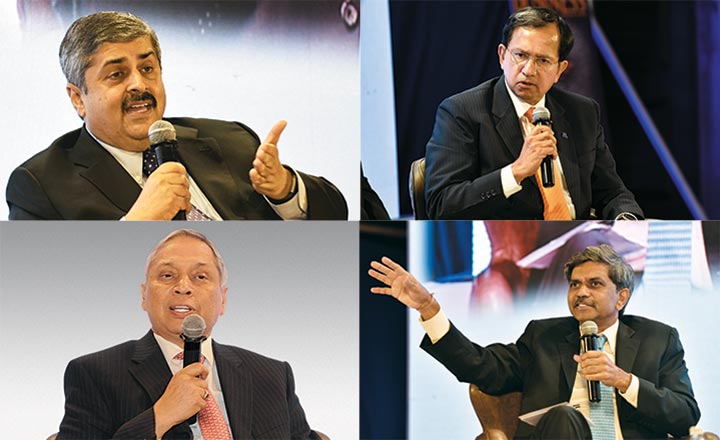Editor N Mahalakshmi: I couldn’t have thought of better names for this discussion and the reason is that all the four gentlemen on the panel have been ‘fortunate’ to have faced adversity at some point in their career. So, starting with Mr. Narayanan, my first question is, just reflect on the most adverse moment in your career and tell me how did you cope and specifically, what are the two things you did that turned out to be beneficial in the future?
Suresh Narayanan: Well, I think there are some people who seem quite attracted to crisis and I count myself among them. My experience and that of my team in the last year-and-a-half handling the Maggi saga was probably the toughest part of my career so far. But I must say that it is not about me, it is about my people and I am extremely proud of the fact that they stood tall and it is they who have made a difference to this organisation. Of the things that I have learnt, the first is, in adversity manage yourself well because people are relying on your guidance and leadership. Secondly, take care of your people and be faithful to your purpose.
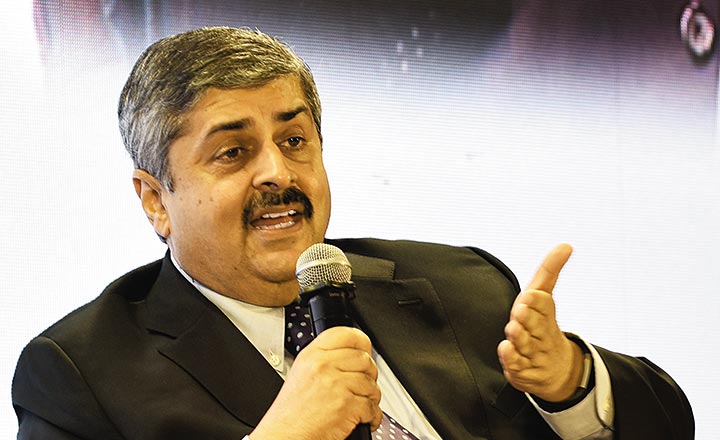
Mr. Puri, can you tell us more about how you handled your biggest career adversity?
Bharat Puri: Unlike Suresh I don’t think I consider myself as somebody who attracts crisis, and as my mother fondly says, “In life when you do something good, something bad might also happen, and if you face something bad, something good will also happen”. I recall being in Bangkok in 2003 with my team and we were being feted as unit of the year because it was October and we had almost met the year’s budget. Then I get this call saying there have been some cases of infestation in Cadbury chocolate and it’s on television. Now, all good food companies have some incident response teams and I thought our incident management team would handle it.
But by the time we got back two days later to Mumbai, it had become a full blown crisis and people were demonstrating outside Cadbury House. I feel those three months were the most harrowing period in my life simply because you are in the middle of something that you are not at all prepared for, and it comes at you from all angles. Across a large part of the media it became like, can you find some defective chocolate? In fact I got weird calls from different places saying I have got this bar in front of me, is there any problem with this chocolate bar, do you have anything to comment on it?
Suddenly one day there were television crews outside Cadbury House. We asked them why you are here and they said the local MLA told us he is coming here for a protest. So, the local MLA came very theatrically with black paint and said he was there to blacken the face of the MD. I was about to go and talk to him but my HR manager stopped me saying he is not here to talk to you, he only wants the television crew to film him applying black paint on your face.
It was the most adverse period and the things that I learnt was that you have to keep a clear head and set clear direction. A lot of multinationals mistake discussions with decisions, but it’s actually about daring greatly and acting quickly. The second thing is you have to keep your team in high spirits and make them believe that they will win. I have always been proud of my team and thanks to them, all through this period that lasted about six months we didn’t lose a single member from the top 40 managers.
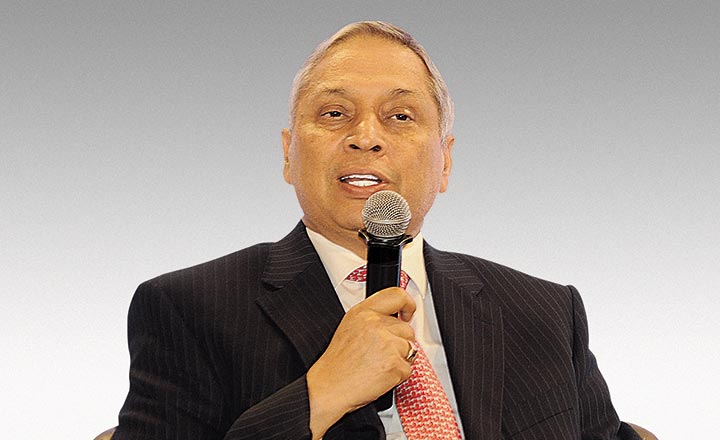
Mr. Uppal, which is the most acute business adversity that you handled?
Ravi Uppal: I have gone through so many business adversities that I feel it is a way of life and it helps you to re-discover yourself. One of them I can recall is ABB in 2001, because of the asbestos issue the company had almost filed for Chapter 11 on a global basis. I was the country head of ABB and although we had #1,000 crore in the bank, our local bankers just froze it on the advice of the parent banks in Europe. It really took a long while for us to get out of it because the entire business activity came to a screeching halt, and my team asked, “We have been doing so well, how can they freeze our bank account?”
Getting the activity back to normal was quite a task but as Bharat said this is the point when you want your entire team to rally behind you, and at this moment you have to really provide very inspirational leadership. You are to lead from the front, you are to prompt from behind and both things have to be done from time to time. It requires a very cool mind and you will face a lot of criticism and pressure on a day-to-day basis. It is a set of multiple challenges which you are not prepared for, but I personally feel that going through adversity is a pressure test of your capability and resilience.
Providing good leadership and communication is extremely important at that point of time, because if you sit back in the corner room and don’t speak to people, don’t share your problems with them, then alienation happens and people get de-motivated. Sometimes the adversity period can last for years together but the ending was happy as we could get back to normal functioning and a few years later, had the highest PE ratio in the country.
Another adversity that we underwent recently was when the government cancelled all the mining licences overnight. The company with the highest profit in the country almost faced bankruptcy. There again we had to get our act together by rebuilding brick-by-brick. Carrying people with you, communicating with them and staging a recovery takes years together, but it does come, you have to have trust in yourself, and you have to lead by example.
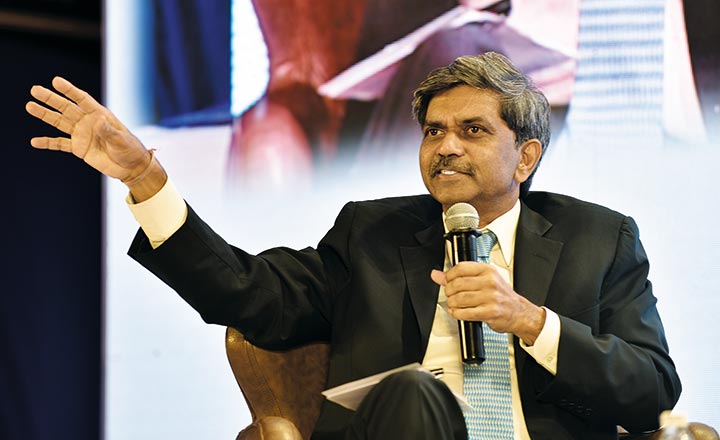
D Shivakumar: The one I remember is the BL5C battery crisis in August 2007, when we had issued an advisory at my ex-company Nokia, to say that about 46 batteries in a batch size of 40 million had overheating issues. The advisory clearly mentioned how they could exchange it. Unfortunately, in many cases in the media, fiction becomes fact. So they said there is a bomb in your back pocket, and other stories were circulated during that one month. The first two weeks were absolutely terrible, because our service centres, distributors and retailers were getting rattled.
We decided to counter it with the help of the industry and while we fronted it, we worked with all the operators. Sanjeev Aga, who is in the audience, helped us a lot in disseminating SMSes to people, saying that here is an easy process by which you can exchange your battery in case it is the BL5C. We took a number of steps which involved the ecosystem and we were extremely transparent in our communication, with the government or via the battery expert. Anybody we thought who had a bearing on this issue, we went and contacted them and they were part of all our briefings. So it worked out well.
For me the lesson learnt is adversity is a huge opportunity, never waste a crisis. Thanks to the manner in which we handled the battery crisis, for the next four years, Nokia was voted the most trusted brand. We never did it with the intention to end up as the most trusted brand, but the way the team handled it, I think that is what led to it, so my lesson from it was, in any crisis the first thing is never externalise. Don’t say competitors are doing this, somebody else is doing this; blaming somebody else is not going to solve any problem.
Never externalise a problem, never have that victim mentality, and ensure that your team does not have that victim mentality. The one characteristic I would say you need is resilience, because those two weeks I can tell you, I never wanted that ever to happen even to my worst enemy. Nelson Mandela said many years ago, ‘Courage is not the absence of fear but the ability to overcome it’. People say it’s lonely at the top, but in adversity it gets lonelier.
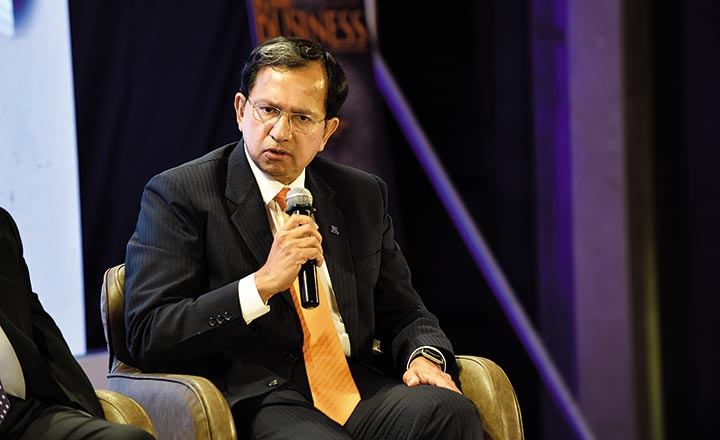
Mr. Narayanan, you were talking about having a clear mind and why that’s fundamental in dealing with any crisis especially during adversity. So what is your mechanism to get past self-doubt and reach clarity?
Suresh Narayanan: Ultimately, what’s important in leadership is to internalise the fact that the buck stops with you. You can get all the advice in the world but you need to have the confidence to face the consequences of your decision. In this entire crisis, the one philosophy that I internalised is, it is not about me, it is about the organisation and the people. So when you do that you insulate yourself from that ego that says that if something happens, I am going to be dead. It’s fine, you have led a good career, a happy life, have a good family and lot of things to thank God for, focus on the people, and get it right.
Bharat Puri: I can resonate with what Shiv said. It is always very easy to say the bureaucracy is wrong or the system is wrong. You are where you are, you have fallen down and you have to get up, and if you don’t recognise this, you are going to wallow where you are. We thought the key was winning back consumer trust as after sometime the press will find something new, the bureaucrat will find somebody new. But if the consumer finds somebody new she is not going to come back.
Keeping the consumer first, we put out a very simple questionnaire across nine cities every week. It asked: Will I buy Cadbury chocolate? Will I feed my children Cadbury chocolate? And will I allow my children to buy Cadbury chocolate? In the heat of the crisis, market share had plunged from 85% to 54%, and we set an objective to take it back to where it was in a year’s time. As we were tracking this, we realised that the important thing was to keep telling the truth. We got Mr Bachchan to do our ad campaign. There is an interesting story to it.
I was at a sales meet at Surakjund, just outside Delhi and the salesman put up his hand and said, “In this country people listen to only two persons. It is either Vajpayee, who was the prime minister then, or it is Amitabh Bachchan. So why don’t we take Amitabh Bachchan for our advertising?” As I was driving back to the airport, I thought there was a lot of merit in what he said. Since it was difficult to get Vajpayee, we went to Mr Bachchan.
After visiting the factory he was thoroughly impressed and the idea to shoot the first advertisement in the factory was his. In any good food company, quality is completely non-negotiable, but when we realised that the consumers still had an element of doubt, we actually introduced double packaging. Of the million bars of Cadbury sold every day, only nine bars had problems, but it became such a big issue that we had to win back consumers. So, we actually got the double packaging done, where we said now this is bulletproof and nothing can go inside. The great thing was we got back our market share in six months and as I said that is the benefit of having a great team.
Mr Uppal, what Mr Narayanan and Mr Puri are talking about are one-time problems but what you talked about was adversity that can take years to rebuild. So, how do you steel yourself and your team because not everybody is able to see the light at the end of the tunnel?
Ravi Uppal: The fact is that no matter how much effort you take, you cannot get everybody to buy your plan for restoring the health of the company. During such an eventuality no matter how much you communicate, there will always be some people who will drop out. But if you can retain and share your vision with them, I think then you have done a great job.
I feel when a company gets into an adverse situation there is this implicit admission that they were not very observant. For example, even Apple if you recall in the late ’80s, they suddenly lost their leading edge and went into hibernation, and ultimately they staged a comeback. Same thing happened to IBM, it also was on its way down and they introspected on what areas they need to put more efforts. Many companies lose out because they don’t innovate. If you are not constantly innovating you are an automatic loser, and you get into an adverse situation because you are becoming irrelevant. So, innovation is a must so that our business concepts remain relevant.
For consumer product companies such as Nestle, Cadbury and Pepsi the problems at times are short term, but in bigger companies, engineering companies, the problems there take much longer to resolve because there are many ramifications of the problems, so you really need to introspect and find out what is it you can do differently. ABB had to deal with the asbestos issue because they thought that using asbestos was good enough for the boilers. Then the Americans said that their lungs are getting affected by using asbestos and we had billions of dollars in claims. We were not prepared for that, we didn’t provide any contingency, and nobody at our end thought that we should check the materials that we use. So, we shouldn’t have used asbestos as time went by and, therefore, had only ourselves to blame and later on with innovation we came up with the new generation of materials.
So, you are quite right in saying that in an industry like ours the period of recovery can be long, so it is necessary that you keep persevering and communicating. What happens at times is that, the solution remains in the minds of the nine wise men at the top, rest of them are only speculating in the corridors, about what’s going on, I think that is a kind of situation we must avoid at any cost.
During economic adversity it is important to keep investing for the future. But when you are battling adversity and are resource constrained, how do you think and prioritise?
D Shivakumar: Yes, that is always a challenge and many times you slow down but invariably consumers tend to reward brands that consistently remind them of why they exist and brands that innovate during that time. Both these factors play a positive role in resurgence when the trough is over. The big challenge during a crisis is that I need to protect my bottomline and the first thing that everybody wants to cut down on is advertising. It is the most dangerous thing to do, because it is like flying in a 747 from here to London and the pilot saying I can still fly with two engines off. I think that is what happens to brands when you shut off the engine, and many people don’t realise this. Most CFOs think that that’s the most logical thing to do.
The second thing is companies might need to focus on big innovations but people will say let the market get better. But I think there is no better time than a challenging phase. Pick your best innovation and go after that, and the third one is you must have a very clear narrative to your team, invariably when there is a crisis out there.
When everybody is struggling to explain why their numbers are not happening, you need a lot of empathy to understand why those numbers are not happening. The leadership needs to say this is the micro picture, and we think it will turn around. If you put pressure on people during a downturn, you become a pressure cooker type of a company, and then people start leaving you because they think management does not understand their problems.
One final question. There are adversities that we face in our career and then there are personal adversities. Can each of you recall one personal adversity and how you overcame it?
Suresh Narayanan: In my personal life the lowest point was when my mother passed away. That tragedy unhinged me the most, but then, I am also a great believer in the Bhagavad Gita. I believe that everybody has ups and downs in life. I try to practice the same in my corporate life also. So, all these big designations don’t matter, what deeds you do and what you leave behind is all that matters. I have internalised one philosophy and that is as a human being you’re a recipient of both pleasure and pain, so if there is pain, learn to cope with it as this too shall pass.
Bharat Puri: I’ll tell you about the personal adversity in the career sense. I have been on both sides, when we acquired companies and when other companies acquired us. The fascinating thing is that when you are an acquirer, you are part of the leading team and suddenly when you are acquired, you go back to zero. Coping with being acquired is tough as it is a mindset change for someone who has long been an acquirer. You don’t know how to handle the situation because you are back to zero from being the head of the company. My learning from all this is ‘Don’t take yourself too seriously’.
Ravi Uppal: I personally feel that as you grow, you get emotionally stable and learn to take upheavals in your stride. I don’t think there is anybody who does not go through personal adversities. You just have to tell yourself that I am going forward and I am a karma yogi; looking back I try to be a fatalist, believing that is how it had to happen and nothing could have changed the course of it. I think that’s the only thing I keep telling myself to try to come to terms with the situation and make the best of it.
It’s good to stay positive because at times there is precious little you can do. I had one relative who was very seriously ill and nobody knew whether she was going to survive. It happened when I was very young and I told myself that I have to be tough and stable to navigate out of that situation. When the mind is peaceful, you can think of better options and how to move forward. I think emotional stability is something that we all must make an effort to achieve; that is what has guided me.
D Shivakumar: When we think of any personal adversity we think of financial and other things in our career, but the biggest adversity is intellectual adversity. At HLL, in the category that I handled, the board and the boss wanted to follow a certain direction, my team and I felt it was not the right marketing strategy, we said this is the wrong way to go in this category. But at the end of the day if the board and the boss have decided, you have to go along like a loyal soldier, that is what we did and it didn’t work. At the end of three months, the board and the boss called us and accepted that it is not working, so now they asked us to try our strategy.
It succeeded and we had good growth, but at that point of time I deeply thought to myself, is this my company? Every day I have come here to work 24x7. This is my company, but for the first time I felt it wasn’t and that is when I decided to leave.
That intellectual adversity and that clash, nothing prepares you for it. Because you know and you think you’re doing the right thing but a lot of people think that they are doing a better thing than you, and that is always a challenge and you can never ever have an answer for it. The answer is negotiation, you can negotiate till you succeed, or you can negotiate your way out of the company but that intellectual adversity is really difficult to handle and that is one of the reasons why people leave companies.



